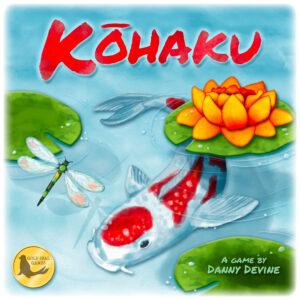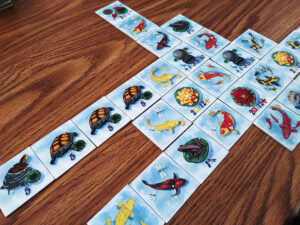 In addition to being Board Game Quest’s self-professed movie person, I also wear a variety of other hats around the office. I pride myself on being the team’s self-professed plant person (“That’s a Ficus, Tony, not a Fir.”) and am often astonished when anyone questions my self-professed mastery of handcrafts (“Macrame is done by hand, not with crochet hooks, Brandon.”)
In addition to being Board Game Quest’s self-professed movie person, I also wear a variety of other hats around the office. I pride myself on being the team’s self-professed plant person (“That’s a Ficus, Tony, not a Fir.”) and am often astonished when anyone questions my self-professed mastery of handcrafts (“Macrame is done by hand, not with crochet hooks, Brandon.”)
One thing I don’t get a chance to talk about much is my advanced knowledge of the animal kingdom, in particular the creatures who live in water. So, as BGQ’s newly anointed (and yet still self-professed) ichthyologist, I jumped at the chance to try out Kohaku from designer and artist Danny Devine. The game is for 1-4 pond-builders and plays in about a half hour.
Gameplay Overview:
Kohaku is a drafting and tile placement game in which players will be building their own personal koi pond and scoring points based on how beautiful it is. (This is determined mostly by adjacency bonuses, which in real life wouldn’t last very long since fish tend to move around a lot.). Each turn, players will take two adjacent tiles from the main pond board. The board is set up in a way so that two fish can never be a taken, nor can two feature tiles. Therefore, players will take one of each on their turn and add them to their own personal play area (er, pond). There are no placement restrictions once you’ve taken the tiles so long as they are placed orthogonally adjacent to a previously placed piece.

There are 12 styles of fish with some being a solid color and others being multicolored. Some fish also have a coin icon on them that will score a point at the end of the game. The feature tiles will score at the end of the game for the fish around them depending on various factors such as the color of the koi or the number of dragonflies on the tiles. (Except the turtle feature tiles. Those sneaky turtles just give you points for no good reason.)
At the end of a player’s turn, they will refill one koi and one feature onto the pond board, and this is Kohaku’s most innovative feature. Tiles are always added to the pond board in the center so anything already there must move to the outer edge. This changes up the pairs available to players on future turns.
The game also includes a solo mode and it works well enough (the automated rival takes its tiles blind from a stack and scores sets), although I’m not sure it’s something I’d want to come back to often.
Those are essentially all the rules for the game. Kohaku lasts 12 rounds in a three- or four-player game and 14 rounds in a two-player game after which players will flip over the pond board to reveal the scoreboard and tally up their points to see whose pond proved most point-worthy.

Game Experience:
I’ll start right off by saying that Kohaku is breezy and fun. It strikes me as the perfect kind of game to play after brunch while on vacation before you go sightseeing somewhere. (That’s a very specific recommendation but I’m sticking by it.)
Mechanically the game is sound and everything seems very balanced in terms of tile availability but there isn’t much of a spark to it beyond its visual appeal. I feel like I’ve played this game before, enjoyed it back then, and completely forgot about the whole experience.

The game’s primary tension of weighing the odds of collecting the exact fish you need based on the drafting board is effective but at lower player counts the drafting board doesn’t change enough to make it particularly tense and at higher player counts the board will change so drastically in between turns that it’s difficult to necessarily plan too far ahead. Again, these are minor gripes for what is intentionally a simple and clean design.
And honestly? The ponds look so cool at the end of the game that it really does feel like each player has accomplished something unique despite who actually is ahead on the scoreboard. (Incidentally, the game has one of those “flip over a different component once you’re ready to start taking score” boards and I always enjoy those but this one comes with tiny fish to track the scores and they move around this board a lot.)
Final Thoughts:
Kohaku might be the barest bones tiling game I’ve played in quite some time. If it sounds like you’ve played a game like this before you probably have and nothing specific in the game feels terribly innovative. Even the mildly interesting way the pond board is reset every turn doesn’t really matter much strategically. It just varies the available tiles.
That being said there’s certainly a place for games like this in the world. It plays incredibly fast and will work with a variety of different play groups. It’s fun, looks great once your pond is finished at the end of the game, and even has a few stressful decisions as players decide which scoring avenues to go after and which tiles to draft. If you’re a big fan of this type of game, I’m convinced you will love Kohaku. Unfortunately, if you’re that big of a fan of this type of game it’s very likely you have a game that is nearly identical to it already.
Final Score: 3 stars – A light, fun experience that doesn’t introduce anything particularly new.
 Hits:
Hits:
• Easy to teach and play
• Games play quickly
• Great art and the ponds look neat at the end of the game
Misses:
• Nothing new here
• Not much room for long term planning
• The fish scoreboard apparatus isn’t great






















